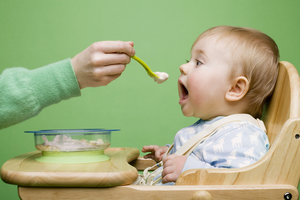Baby food industry needs better products and clearer labelling
Public Health England (PHE) publishes an evidence review of commercially available baby foods and drinks aimed at children up to 36 months.

Baby being fed
The main findings of the report Foods and drinks aimed at infants and young children: evidence and opportunities for action show clear inconsistencies between national infant feeding advice and how some commercial baby food and drink products are presented:
- some foods marketed as healthy snacks are amongst those with the highest sugar content
- sweet snacking is being encouraged
- misleading product labelling and marketing encourages the introduction of solid food before official advice recommends
- some product names don’t reflect the balance of ingredients
- products do not always provide clear feeding instructions
Snacking foods account for more than one third (34.5%) of the total market, and the highest sugar content is found in processed dried fruit snacks which shouldn’t be marketed as suitable for children to eat between meals. Growth in the finger food/snacking market, by 11% in 2017 to 2018, indicates that these foods are increasingly considered an expected and appropriate part of an infant’s diet. However, some sweet snacks, can contain as much sugar as confectionery. The highest average sugar levels are seen in fruit and vegetable-based (47.5g), and sweet finger foods (17.0g) per 100g.
Of the 1,120 baby food and drink products reviewed for the report, more than 1 in 4 (28.1%) are targeted at 4 month olds despite advice from the Scientific Advisory Committee on Nutrition (SACN) that introducing solid foods should not happen until around 6 months of age.
To push change in the products, the review recommends that the food industry and government:
- improves the nutrient content of products
- ensures clear, consistent and honest labelling and marketing of products
- ensures that products high in sugars are labelled as not being suitable for eating between meals
- restricts the use of implied health claims on baby food products
It also recommends:
- putting in place a recurring survey of early years feeding practices to further the evidence base
- prioritising consumer awareness campaigns around early years feeding
Dr Alison Tedstone, Chief Nutritionist at PHE, said:
This shows the food industry could do more to support parents in making the best food choices for their children. Snacking and sweet foods are being promoted while parents are being encouraged to introduce solids earlier than recommended.
Early years feeding is crucial in shaping future taste preferences and healthy habits. With children of all ages consuming too much sugar action is needed to address these practices. The baby and toddler food industry must be careful not to break the trust of parents.
Background
-
PHE’s review ‘Food and drinks aimed at infants and young children: evidence and opportunities for action’ includes:
- UK and international recommendations and advice for feeding infants and young children aged 6 to 36 months
- dietary requirements, recommendations and intakes for sugar, salt and energy
- use, role in the diet, and impact of consumption on health outcomes, of commercial baby foods and drinks
- consumer views on commercial baby foods and drinks
- characteristics of the UK baby food and drink market, including types of products, recommended age of use, packaging and labelling, and nutrient composition
- stakeholder views on the scope for action to improve commercial baby foods and drinks
-
The available evidence demonstrates there is a need for action, showing that infants and young children are eating too much sugar and salt, and energy intakes are exceeding requirements. Around 1 in 5 children aged 2 to 4 years are overweight or obese, and 12% of 3 year olds have visible tooth decay.
-
Support is available to parents and carers looking for trusted advice through the Start4Life website and the ‘weaning hub’, with PHE set to launch a new campaign in 2020 helping people throughout pregnancy, birth and parenthood.
-
Official guidance recommends that parents introduce single fruit and vegetables as first foods at around 6 months to help babies accept a wide range of different tastes. Currently, sweeter products consisting of mixed fruit, mixed vegetables or mixed fruit and vegetables, make up 85% of fruit and vegetable first foods.
-
Evidence shows that 75% of children (aged 4 to 18 months) were exceeding UK energy requirements, and this continued following the introduction of solid foods.